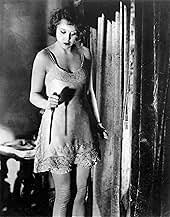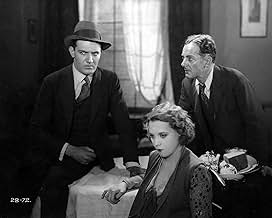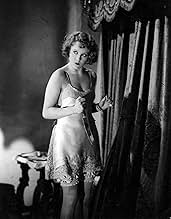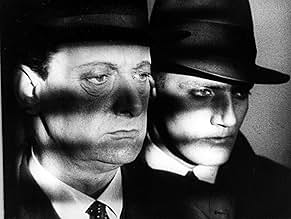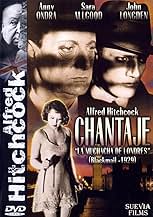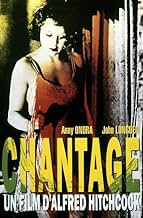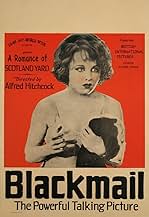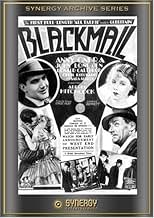After killing a man in self-defense, a young woman is blackmailed by a witness to the killing.After killing a man in self-defense, a young woman is blackmailed by a witness to the killing.After killing a man in self-defense, a young woman is blackmailed by a witness to the killing.
- Awards
- 2 wins total
Ex-Det. Sergt. Bishop
- The Detective Sergeant
- (as Ex-Det. Sergt. Bishop - Late C.I.D. Scotland Yard)
Johnny Ashby
- Boy
- (uncredited)
Joan Barry
- Alice White
- (voice)
- (uncredited)
Johnny Butt
- Sergeant
- (uncredited)
Alfred Hitchcock
- Man on Subway
- (uncredited)
Phyllis Konstam
- Gossiping Neighbour
- (uncredited)
Sam Livesey
- The Chief Inspector (silent version)
- (uncredited)
Phyllis Monkman
- Gossip Woman
- (uncredited)
Percy Parsons
- Crook
- (uncredited)
Storyline
Did you know
- TriviaMuch of this movie was originally shot silently. When sound became available during the course of shooting, Sir Alfred Hitchcock re-shot certain scenes with sound, thus making it his first talkie. There was one complication with this change, however. Leading lady Anny Ondra had a thick Czech accent which was inappropriate to her character, Alice White. Joan Barry was chosen to provide a different voice for her, but post-production dubbing technology did not exist then. The solution was for Barry to stand just out of shot and read Alice's lines into a microphone as Ondra mouthed them in front of the camera. This is generally acknowledged as the first instance of one actress' voice being dubbed by another, even though the word "dub" is technologically inappropriate in this case.
- GoofsWhen Alice "unlocks" the door to the building where she lives, it starts to open as soon as the key reaches the door. It was clearly not only not locked, but not even latched. However, she goes through with the motion of unlocking it.
- Quotes
Alice White: You and your Scotland Yard. If it weren't for Edgar Wallace, nobody'd ever heard of it.
- Alternate versionsOriginally filmed as a silent movie, running 75 minutes; Hitchcock later added newly shot scenes and had other existing footage dubbed to create a talkie version, running 86 minutes.
- ConnectionsEdited into Der Zinker (1931)
- SoundtracksMiss Up-to-Date
(1929) (uncredited)
Words by Frank Eyton and music by Billy Mayerl
Performed by Cyril Ritchard
Featured review
It's not the crime itself, but the cover-up that entraps two lovers in this cleverly sinewy suspense film shot by Alfred Hitchcock early in his career.
How early? Apparently, the sound era arrives about ten minutes in, as the opening reel is shot entirely as a silent movie (minus "quote" cards) before switching to audible dialogue. Yet like many seemingly creaky elements of "Blackmail", this is something that actually works to the film's benefit and gives it a stylistic uniqueness that helps it stand out today.
Alice (Anny Ondra) steps out on her police detective boyfriend Frank (John Longden) to have fun with an artist she fancies named Crewe (Cyril Ritchard). A crime is committed instead, and she finds herself back in Frank's arms seeking his protection. Unfortunately for both of them, a sponger lowlife named Tracy (Donald Calthrop) knows what's doing and pressures the pair for his silence.
To really appreciate "Blackmail's" skewed perspective, it's important to understand Hitchcock's complex view of the law. By all accounts a law-abiding, socially upright man, he nevertheless nursed an extreme dread of John Law dating back to a childhood episode when he was locked in a cell to be taught a lesson. As a director, Hitchcock presented authority figures as vaguely menacing, while reserving his greatest sympathy for outsiders who found themselves, rightly or wrongly, on the run.
The first image of "Blackmail" is the spinning tire of a police quick-response van, or is it a roulette wheel? The capricious nature of law enforcement is always on view, whether it's a bobby sauntering outside an apartment window while Alice screams for help inside or Frank using his authority to subvert a murder investigation.
This is the rare Hitchcock film that features fine acting bottom-to-top, but Calthrop stands out best as Tracy, the personification of the core ambiguity of this film. Described as "kind of mousy", given to smirking while pleading for help and whistling when he thinks he has the upper hand, Tracy seems easy to hate at first glance but isn't, not as Calthrop imbues him with a vulnerability anyone can relate to, cutting across the staginess around him with a dynamic performance that anticipates how cinema liberated the actor from hidebound stagecraft.
"One's got to live, you know!" he says, but the people he says this to act as if this is yet another of Tracy's unreasonable demands. We end the film pulling for him with as much passion as we pulled away from him at first encounter.
Subtle directorial touches abound, like Alice holds her face in an expression we see mirrored in a cut-to scene of Tracy fleeing through the British Museum while an impassive giant mask looks on. There's also clever use of the new sound medium (the "knife" one's not subtle, but a lot of fun) and knowing humor, like a conversation about a new crime film. Frank, being from Scotland Yard, scoffs at such fiction, but Alice thinks it has merit: "I heard they got a real criminal to direct it, just to be on the safe side."
About the only negatives are the static compositions and bad audio, problems of the period and not of the film. "Blackmail" even has a terrific final shot, which Hitchcock never topped until his final film, "Family Plot". It's another rueful note on the hit-or-miss quality of law enforcement, one that stays with you after the laughter fades.
How early? Apparently, the sound era arrives about ten minutes in, as the opening reel is shot entirely as a silent movie (minus "quote" cards) before switching to audible dialogue. Yet like many seemingly creaky elements of "Blackmail", this is something that actually works to the film's benefit and gives it a stylistic uniqueness that helps it stand out today.
Alice (Anny Ondra) steps out on her police detective boyfriend Frank (John Longden) to have fun with an artist she fancies named Crewe (Cyril Ritchard). A crime is committed instead, and she finds herself back in Frank's arms seeking his protection. Unfortunately for both of them, a sponger lowlife named Tracy (Donald Calthrop) knows what's doing and pressures the pair for his silence.
To really appreciate "Blackmail's" skewed perspective, it's important to understand Hitchcock's complex view of the law. By all accounts a law-abiding, socially upright man, he nevertheless nursed an extreme dread of John Law dating back to a childhood episode when he was locked in a cell to be taught a lesson. As a director, Hitchcock presented authority figures as vaguely menacing, while reserving his greatest sympathy for outsiders who found themselves, rightly or wrongly, on the run.
The first image of "Blackmail" is the spinning tire of a police quick-response van, or is it a roulette wheel? The capricious nature of law enforcement is always on view, whether it's a bobby sauntering outside an apartment window while Alice screams for help inside or Frank using his authority to subvert a murder investigation.
This is the rare Hitchcock film that features fine acting bottom-to-top, but Calthrop stands out best as Tracy, the personification of the core ambiguity of this film. Described as "kind of mousy", given to smirking while pleading for help and whistling when he thinks he has the upper hand, Tracy seems easy to hate at first glance but isn't, not as Calthrop imbues him with a vulnerability anyone can relate to, cutting across the staginess around him with a dynamic performance that anticipates how cinema liberated the actor from hidebound stagecraft.
"One's got to live, you know!" he says, but the people he says this to act as if this is yet another of Tracy's unreasonable demands. We end the film pulling for him with as much passion as we pulled away from him at first encounter.
Subtle directorial touches abound, like Alice holds her face in an expression we see mirrored in a cut-to scene of Tracy fleeing through the British Museum while an impassive giant mask looks on. There's also clever use of the new sound medium (the "knife" one's not subtle, but a lot of fun) and knowing humor, like a conversation about a new crime film. Frank, being from Scotland Yard, scoffs at such fiction, but Alice thinks it has merit: "I heard they got a real criminal to direct it, just to be on the safe side."
About the only negatives are the static compositions and bad audio, problems of the period and not of the film. "Blackmail" even has a terrific final shot, which Hitchcock never topped until his final film, "Family Plot". It's another rueful note on the hit-or-miss quality of law enforcement, one that stays with you after the laughter fades.
Details
Box office
- Gross worldwide
- $160
- Runtime1 hour 25 minutes
- Color
- Aspect ratio
- 1.20 : 1
Contribute to this page
Suggest an edit or add missing content


